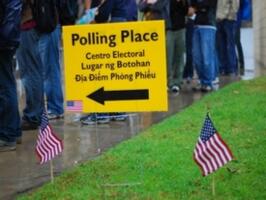Americans Still Have Very Little Faith in Their Fellow Voters
An overwhelming majority of U.S. voters think voters in democratic countries have a responsibility to stay informed, but most say that’s not the reality in America.
A new Rasmussen Reports national telephone survey finds that 91% of Likely U.S. Voters think voters in countries with democratically elected governments have a responsibility to be informed about major policy issues. Just three percent (3%) disagree. (To see survey question wording, click here.)
But only 11% feel most Americans are informed voters. Eighty-one percent (81%) think most are not.
Findings for both questions are little changed from a year ago. In 2013, just 12% of Americans thought most of their follow citizens were informed voters, while 73% believed most of them voted chiefly based on their emotions instead.
Voters still turn to TV over the Internet when it comes to political news, but the gap is narrowing. Most voters, however, doubt the accuracy of political news coverage and think most reporters will slant their coverage of the 2016 presidential campaign.
(Want a free daily e-mail update? If it's in the news, it's in our polls). Rasmussen Reports updates are also available on Twitter or Facebook.
The survey of 950 Likely Voters was conducted on May 25-26, 2015 by Rasmussen Reports. The margin of sampling error is +/- 3 percentage points with a 95% level of confidence. Field work for all Rasmussen Reports surveys is conducted by Pulse Opinion Research, LLC. See methodology.
Most voters (55%) say the United States is more democratic than most other nations, and 61% still believe their vote really matters. But most also think voters in this country do not have enough say when it comes to choosing their leaders.
Large majorities across the demographic spectrum agree that voters in democracies have a responsibility to stay informed and that most American voters aren’t.
Twenty percent (20%) of Democrats believe most Americans are informed voters, but only seven percent (7%) of both Republicans and voters not affiliated with either major political party agree.
Men are more likely than women to think most Americans are informed voters.
The more education a voter has received, the more likely he or she is to think Americans are not informed voters.
Some have suggested making voting mandatory in the United States to raise turnout and create “a more moderate and more representative electorate.” But voters strongly reject that idea.
Twenty-eight percent (28%) of all voters say it is too easy to vote in America today. Eighteen percent (18%) think it’s too hard to vote, while 49% rate the level of difficulty as about right. But voters are more confident in the fairness of U.S. elections than they have been in over two years.
A sizable number, including most Democrats, now believe that illegal immigrants should be allowed to vote if they can prove they live in this country and pay taxes.
Additional information from this survey and a full demographic breakdown are available to Platinum Members only.
Please sign up for the Rasmussen Reports daily e-mail update (it’s free) or follow us on Twitter or Facebook. Let us keep you up to date with the latest public opinion news.
The survey of 950 Likely Voters was conducted on May 25-26, 2015 by Rasmussen Reports. The margin of sampling error is +/- 3 percentage points with a 95% level of confidence. Field work for all Rasmussen Reports surveys is conducted by Pulse Opinion Research, LLC. See methodology.
Rasmussen Reports is a media company specializing in the collection, publication and distribution of public opinion information.
We conduct public opinion polls on a variety of topics to inform our audience on events in the news and other topics of interest. To ensure editorial control and independence, we pay for the polls ourselves and generate revenue through the sale of subscriptions, sponsorships, and advertising. Nightly polling on politics, business and lifestyle topics provides the content to update the Rasmussen Reports web site many times each day. If it's in the news, it's in our polls. Additionally, the data drives a daily update newsletter and various media outlets across the country.
Some information, including the Rasmussen Reports daily Presidential Tracking Poll and commentaries are available for free to the general public. Subscriptions are available for $4.95 a month or 34.95 a year that provide subscribers with exclusive access to more than 20 stories per week on upcoming elections, consumer confidence, and issues that affect us all. For those who are really into the numbers, Platinum Members can review demographic crosstabs and a full history of our data.
To learn more about our methodology, click here.





